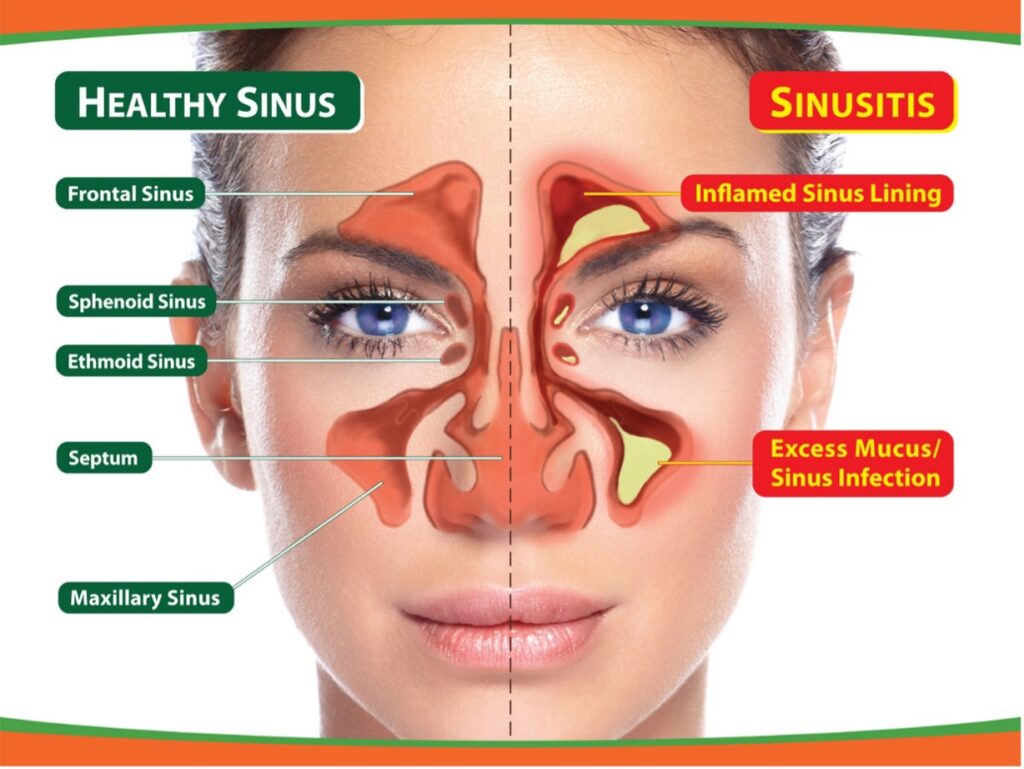Toothache or Sinus? By Dr. Lee Lichtenstein

Ouch…you feel miserable. You feel pressure in your ear, your head hurts, half of your face is throbbing constantly, and you feel aching in your teeth.
You call your doctor and describe the problem…you just described a sinus infection or acute sinusitis.
The sinuses are pairs of empty spaces in your skull connected to the nasal cavity. If you have sinusitis, the tissues in those spaces become inflamed, often causing pain.
Classic symptoms, but not all the possible ones. You may also get a bad taste in your mouth, an altered sense of smell, an earache, fever, fatigue, and a cough. Pain in the upper teeth is a fairly common symptom with sinus conditions. The roots of the upper teeth are very near or may even extend into the sinus cavity. A sinus infection can often mimic a toothache, especially on upper teeth.

The problem with diagnosing sinuses is they are not all visible with a look up your nose with a scope. Depending upon which sinus is inflamed, you may experience symptoms a bit differently, such as where your head hurts. Your Frontal, Sphenoid, and Ethmoid Sinus will present more like a headache behind the eyes, whereas the Maxillary Sinus puts pressure on the roots of your teeth and cause a throbbing, painful mouth. The roots of upper molars (and sometimes premolars) are near the floor of the maxillary sinus, or even within the sinus outright. The pressure buildup from sinus infections exerts pressure on the roots of upper teeth, causing a sensation of fullness or even dull, mild pain in the teeth themselves.
An acute sinus infection, also called sinusitis, is usually caused by a virus. Most cases of sinusitis clear up within 10 days. Antibiotics are not needed for acute viral sinusitis, only when a secondary bacterial infection is involved.
Many of the symptoms described above for sinus inflammation also describe a toothache, which can come from decay, an abscess, infected gums, and even grinding or clenching your teeth.
Tooth pain may affect the whole side of your face, but is more intense at the site of the infection. You may also have a bad taste in your mouth, headache, fever, and bad breath but with the addition of sensitivity to hot and cold, swollen lymph nodes under your jaw, possible swelling in your face, check, neck, and around the bad tooth. Both sinus pain and tooth pain typically get worse when you lay down.
Tooth discomfort accompanying sinusitis is slightly different than a toothache originating from the tooth itself. If many of your upper back teeth are painful or sensitive, it is likely due to a sinus issue, whereas pain on a single tooth is more likely a real problem. Moderate to severe pain is more likely to be the result of an issue with the tooth.
An untreated toothache will most likely get worse. It could be an abscess, which can happen when teeth decay and become infected. In cases of tooth abscess, you may start having changes in your gums. Abscess formation is associated with swelling in the adjacent tissue. Typical changes include an increase in volume and redness in the area, which is also a sign of a periodontal abscess.
Typically, an antibiotic will be prescribed specifically for a tooth infection. Amoxicillin, penicillin, cephalexin, clindamycin, and azithromycin are commonly prescribed. The abscess may need to be drained and further treatment may be needed.
If you are experiencing pain, and are not sure where it is coming from, it is a good idea to consult your dentist first. They will look for possible causes of your toothache and can easily rule it out as the source. If this is the case, immediate treatment should not be delayed.
When you are with Dr. Lee Lichtenstein, you can be assured of the finest training. Dr. Lichtenstein is a Board-Certified Dental Anesthesiologist, an active member of 11 Dental Societies, holds 6 Fellowships, and is a consultant to the State Board of Dentistry. This is definitely a dental health provider that loves what he does. His extraordinary education, expertise, and experience set Dr. Lichtenstein above and beyond the other dentists in a very wide radius around Monmouth County.
Give us a call, come on in for a consultation, and learn how you can lay back and enjoy a visit to the dentist. Dr. Lee Lichtenstein and his highly trained staff offer general dentistry services as well as dental treatments that can be performed using sedation dentistry and general anesthesia techniques to make patients’ experiences more pleasant and comfortable.
